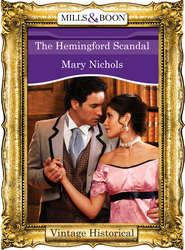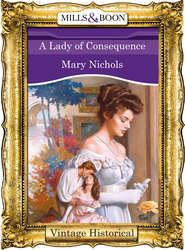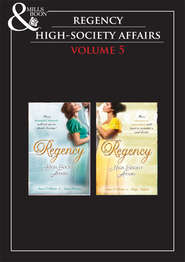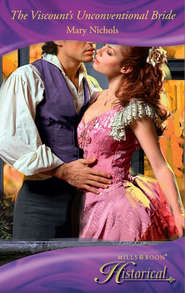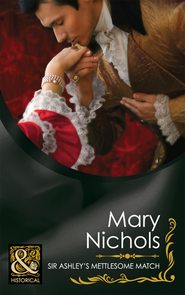По всем вопросам обращайтесь на: info@litportal.ru
(©) 2003-2024.
✖
Working Man, Society Bride
Настройки чтения
Размер шрифта
Высота строк
Поля
‘How are you going to do that?’ Esme asked. ‘Is he coming here?’
‘No, Mama and Papa are taking me to Linwood Park at the invitation of the Viscount. We are going to visit for a few days next month.’
‘Oh, how I envy you.’
Lucy smiled at her younger sister. At fourteen she was not yet out of the schoolroom. ‘Your turn will come.’
‘Not before I’ve had mine,’ Rosemary said. ‘And you can be sure I shall not turn my nose up at someone like Mr Gorridge, simply because he is merely pleasant. Pleasant will do for me if a place like Linwood Park comes with it.’
‘Rosie, how can you say that?’ Esme said. ‘That would be asking to be miserable. Wealth is no guarantee of happiness.’
Rosemary laughed. ‘No, but I could be miserable in comfort. Love is all very well, but it cannot survive in a garret. I certainly should not like it.’
‘It’s a good thing we are not all alike, Rosie,’ Lucy said. ‘Or no poor man would ever marry.’
‘Like marries like,’ Rosemary said flatly. ‘It’s the way it is. A lady cannot marry a labourer, any more than a princess would marry a pauper.’
‘Well, I am determined not to wait until after I’m married to fall in love with my husband,’ Esme put in. ‘Supposing you married someone and then met someone else and fell in love with him, it would be too late, wouldn’t it? I would rather not risk it.’
It was a sentiment with which Lucy concurred. She would give herself a chance to fall in love with Mr Gorridge and she hoped it would happen because, if she refused him, she did not know what her parents would say or do. Did the labouring classes have these problems? she wondered. Did their parents dangle prospective partners in front of them and expect them to marry on the slightest acquaintance? What incentive would there be to do that? They were not encumbered by titles and wealth and the need to marry well. Sometimes she regretted her father’s rank and the need for her to conform. On the other hand, Rosie was right; she would not like living in a garret at all. If garrets were anything like the servants’ rooms on the top floor of Luffenham Hall, they were too small to swing the proverbial cat and where would she keep all her clothes? There wasn’t much chance of that happening, considering she was unlikely to meet a labourer socially. How else did couples meet and fall in love? She resolved to try very hard to love Mr Gorridge and the best way to do that was to concentrate on his good points and ignore those she found less attractive.
As soon as they had finished their meal she told her sisters she was tired after her journey and, dropping a kiss on the cheek of each, went up to bed.
She woke early next morning to the sound of birdsong and, without waiting for the chambermaid, hurried out of bed to draw the curtains. The window looked out on the stable yard; beyond that was a paddock and on the other side of that the park that made up the grounds of the Hall. The village of Luffenham could not be seen from the house because of the screening of trees, but the top of the steeple was visible against a clear blue sky. It was going to be another scorching day. She washed in the cold water left on the wash stand, scrambled into her habit, tied back her hair with a ribbon and pulled on her riding boots. Grabbing her hat, she hurried downstairs to the kitchen.
‘My, you’re about early, Miss Lucy,’ Cook said. ‘I’ve only just started preparing breakfast.’
‘A glass of milk and a piece of toast will do, Mrs Lavender. I’ll have it here, like I used to when I was little. I want to have a ride before it gets too hot.’
‘Miss Lucinda, you are not little any longer. You are a young lady who is well and truly out, and I am not sure your mama would approve of you eating in the kitchen.’
‘Oh, don’t be so stuffy, Mrs L. Besides, Mama is still fast asleep in bed.’ It was said with an engaging smile. ‘If I wait to have breakfast in the dining room, the morning will be half gone.’ And with that she put her hat on the table and sat down, knowing she would have her way. The cook sighed and poured her a glass of creamy milk, just delivered from the cowshed, and pushed a toasting fork into a slice of bread. ‘I’ll do it,’ Lucy said, taking it from her. ‘You get on with whatever you were doing.’ She sat on the fender in front of the range and opened its door to toast the bread.
‘You’ll spoil your complexion sitting so close to the fire,’ Cook said. Her own cheeks were rosy from working in constant heat. ‘Hold something in front of your face.’
Lucy laughed and ignored her. ‘What has been going on while I’ve been away? Has Sally-Ann’s young man proposed yet?’ Sally-Ann was one of the maids who was walking out with a groom. ‘Has your sister had her baby? Have they started haymaking on Home Farm?’
The cook laughed. ‘You don’t change, Miss Lucy. Still as full of questions as ever.’
‘How can I learn if I don’t question?’
‘And that’s another one. In answer to your first, yes, Andrew has proposed, but they’ve decided to wait a year before naming the day, and you are burning that toast.’
Lucy hastily pulled it off the fork and turned it over before holding it to the fire again. ‘And the rest?’
‘My sister has had a boy, but it was touch and go. It was a difficult birth and she lost a great deal of blood and the infant was weak—’ She stopped suddenly, remembering her audience was an unmarried and carefully nurtured young lady. ‘But I should not be telling you such things. Suffice to say he is beginning to put on a little weight now and is to be called Luke after his father. And I forget your last question.’
‘Have they started the haymaking?’
‘I heard they were going to make a start today. Why do you want to know that?’
‘I like to watch the men at work.’
‘Miss Lucy!’ The cook was shocked, knowing, as Lucy did, that the men worked in shirtsleeves, many of them with their sleeves rolled up, displaying muscular arms and, in the absence of collars and ties, a certain amount of neck and chest.
Lucy, laughing, removed the toasted bread from the fork and returned to the table to spread it thickly with butter. ‘There’s no harm in seeing how the work is done. I admire the skill of the men, all working in unison. It must be back-breaking, but they are all so cheerful.’
‘So they would be, considering the wet winter we had and everything so late. They are glad to be working again. Are you sure you won’t have any more to eat? That’s hardly enough to keep you going all morning.’
‘It is quite enough, Cook. For the last two months I’ve had nothing but seven-course meals, tea parties and complicated picnics. I have had my fill of food.’
‘You enjoyed yourself, then?’
‘Oh, yes, it was wonderful, but I’m glad to be home.’ She finished the milk. ‘Now I’m off to have Midge saddled.’ With that she picked up her hat and danced out of the kitchen door, munching the last of the toast as she went.
The outside staff were all busy. Some were working in the garden, others grooming the horses that had brought her and her mother home. Some were cleaning out the carriage; others were saddling up some of the riding horses to exercise them. The horse master had a young colt on a long lead and was training him to answer to the bit. She watched for a moment in admiration and then went into the stables where Midge put her head over one of the doors and snickered. She stroked her nose. ‘Have you missed me, old thing? Well, let’s go and have a good gallop, shall we?’ She opened the door and slipped inside to saddle her.
‘Miss Lucy, I’ll do that for you.’ It was young Andrew, Sally-Ann’s intended.
‘Thank you, Andrew, but, if you are busy, I can do it myself.’
‘Not too busy, miss. I mean, my lady.’ He hurriedly corrected himself, remembering she had just returned from her dеbutante season in London and that meant she was grown up and a proper lady now and must be treated as such. ‘I must make sure the girth is properly tightened or his lordship will have my head on a plate.’
She laughed. ‘Miss will do fine, Andrew.’ She watched as he deftly saddled the mare. ‘I believe congratulations are in order.’ And, because he looked puzzled, added, ‘I understand you have spoken for Sally-Ann.’
‘Oh, yes, miss, thank you, miss.’ He led the horse out into the yard and bent to clasp his hands for her to mount. ‘Mind how you go. She hasn’t had much exercise lately.’
‘I will.’ She accepted her crop from him and trotted out of the yard towards the drive. Halfway down she turned and cantered across the grass and on to the parkland that surrounded the Hall.
Midge was frisky and Lucy decided that the park was too restricting and made her way to a gate, which led on to a lane. From there, she found her way on to a wide, grassy track between a meadow and a field of growing wheat. Due to a cold, wet spring, the second year in succession, the wheat had struggled to grow and the harvest would be late. She had heard tell that there was new machinery being tried that would do the job of several men and wondered if they would accept that, or would they be afraid of being thrown out of work, as the cotton workers had been a few years before? Life was hard enough for them as it was, what with one poor harvest after another and the price of corn kept artificially high, but how would they fare if farmers began to mechanise jobs that until now had been done by men?
The haymakers were busy in one of the meadows and she reined in for a minute to watch. The men were moving steadily forward, their muscular arms, tanned from the sun, working to an age-old rhythm. Swathe after swathe fell to their scythes and behind them the women raked it out to dry in the sun. She rode on and up on to the heath, where she let the mare have her head and before long they left the cultivated fields behind. The heath was covered in scrub and a few trees, where sheep nibbled at the heather and sparse grass. Skylarks nested up here, and butterflies flitted from flower to flower. Overhead a kestrel hovered.
She drew the horse to a walk as they topped the rise and then stopped to sit, looking down on to a valley with a river snaking along the bottom. Down there were more cultivated fields, and a few farm buildings. Across the valley more sheep grazed on more meadows. It was all her father’s land, acres and acres of it that had been in the family since the Reformation, as he was very fond of telling anyone who would listen. It was good hunting-and-shooting country, too, and later in the year her father would invite friends and relations to stay for a week’s shooting and again just after Christmas for the hunt, as he did every year.
She put her hand up to her face to shade her eyes when she spotted three men in the valley. They were certainly not labourers, because two were dressed in top hats and tailcoats. The third was more casually dressed. They appeared to be examining something on the ground and she spurred her horse down the steep slope towards them, crossed a narrow wooden bridge over the river and cantered up to them. She realised as she drew near that they were using a theodolite and one carried a notebook in which he was making notes. They looked towards her when they heard the horse and the youngest of the three, who had been squatting down examining the ground, stood up.
He was a hugely impressive specimen of manhood. Well over six feet tall, his shoulders were massive, straining the cloth of his tweed tailcoat. His chest was broad and his hips, clad in plain brown trousers, were slim. He wore a loosely tied neckcloth and, unlike the other two, he was hatless. His curly light brown hair was worn collar length. He had large hands that, at the moment she reined in and stopped, were crumbling the soil between his fingers.
He smiled, displaying even, white teeth. ‘Good morning, miss.’ His accent, while by no means uncouth and certainly not betraying the patois of the peasant, was not refined as a gentleman’s would be. She found it difficult to take her eyes off him and, though she knew there were two others present, she was facing him and him alone.
‘What are you doing?’ she asked, without returning his greeting.
‘Surveying, miss.’
‘Surveying what?’
‘The land, miss, for a railway.’







